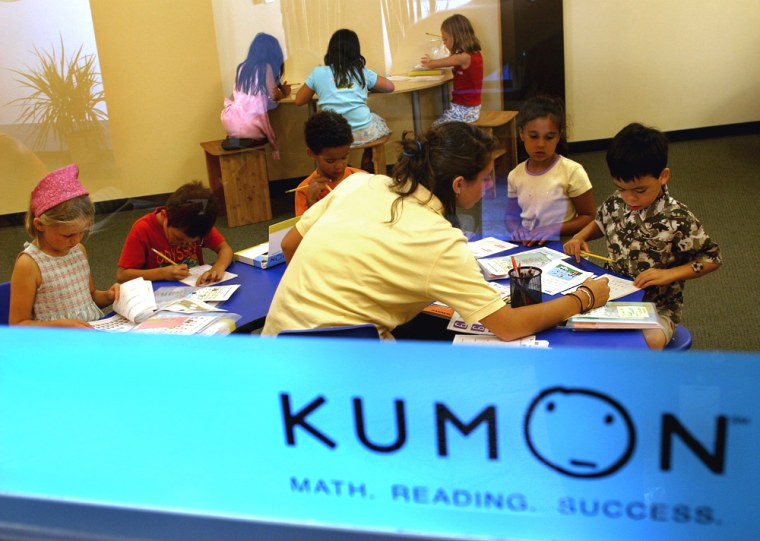Jeannie Ianelli’s son was failing fourth-grade math and she was desperate to find a solution.
Alex was the math whiz in her son’s class and when she found herself sitting next to his mom at a baseball game, she asked for help. The answer turned out to be Kumon, an after-school learning center that helps students master math and reading skills.
More than 10 years later Ianelli, now a mother of four, is the owner of two Kumon centers in Seattle with a combined enrollment of nearly 400 students, who each pay tuition of about $100 a month.
The program is just one of the many players in the $3.5 billion tutoring industry, which is growing rapidly as more parents spend money to help their kids catch up -- or give them an edge in the classroom.
"Parents want to do all that they can to help their children be the best that they can," said Mary Foster, president of Sylvan Learning Centers, a leader in the field and rival to Kumon. "I think that has really motivated parents to buy, in our case, services to help their children."
Growth factors
The tough competition for college admissions is just one reason parents are digging deeper into their pockets. College enrollment rates for 18- to 24-year-olds have increased from 26 percent in 1980 to 38 percent in 2003, according to federal statistics. That makes it tougher than ever to grab freshman spots even at many public universities.
Just applying for colleges requires essays, recommendations, SAT scores and extracurricular activities, but high-school grades are the primary factor in admissions, according to the Princeton Review, a company that focuses on helping students get into college. Being class president or the school’s newspaper editor is not enough for colleges without solid grades.
And although the federal law has to offer their services to lower-income children, paid for by federal tax dollars, parents still pay for about two-thirds of such tutoring services, according to Mark Jackson, senior analyst at Eduventures, a research firm for the education market.
Last week Educate Inc., the parent company of Sylvan Learning Centers, reported its revenues for the first half of 2005 increased 19 percent to $201.3 million, driven mainly by the growth in its consumer segment. Revenues for its Learning Centers totaled $123.5 million, up 32 percent from the same period last year.
Kumon, the other leading provider, is privately held and does not release financial figures.
To keep up with rising consumer demand, companies like Kumon and Sylvan are opening new centers at a rapid clip and launching new services, including online tutoring.
Location, location, location
In an interview last year, Educate’s chief executive officer R. Christopher Hoehn-Saric said he wanted the company to expand as Starbucks did in the coffee business.
"This is a real estate play right now — it’s location, location, location," said Jackson, the analyst. "These tutoring programs are face-to-face, out-of-the-home ventures for these companies. It's about easy access."
So far this year Sylvan has opened 41 new locations, bringing its total to 1,103 centers, and it plans to add 15 to 20 more in the second half of 2005.
And as long as they see demand, Sylvan will keep opening more centers.
"We’ve gotten smarter about listening to consumers," said Foster, Sylvan's president. "Convenience is a major trend for consumers. They want not just education or tutoring services to be convenient, but they want more convenience in life. So if things are easier to use, more conveniently located, they like that."
Kumon added 162 U.S. locations in the past year and currently has 1,352 franchises nationwide.
Getting ahead
Tutoring services are not just for students struggling with classwork, but programs are now equally mixed with students who just want to get ahead. The Kumon method, which has students master a skill at their own pace before moving on to the next assignment, draws appreciation from parents who are looking to build a strong foundation that their kids can apply in the future.
"Through daily practice, children (perhaps unknowingly) become comfortable with a test-like format and learn good time management skills and goals," Kumon parent Susan Stearns told MSNBC.com. "Because the assigned daily homework occupies only a small amount of time, typically 10-15 minutes, it doesn't cut into school homework, extracurricular activities, or just-being-a-kid time."
Stearns’ son Chase, who enters fourth grade next month, has been in Kumon since the middle of first grade.
Parents are enrolling their children at younger ages because the expectations of what kids should know before coming to school is much higher, said Kumon owner Ianelli. Some teachers focus their entire curriculum on preparing students to pass tests required under No Child Left Behind, leaving little or no time for teaching basic skills like multiplication and forcing parents to educate their children outside of the classroom. For parents who have the income, tutoring can help.
"We wanted to make sure that Chase had a solid foundation in math, especially when it came to basic math facts and operations," Stearns said. "We were interested in finding a program that would enhance that learning without resorting to mind-numbing drills and flashcards, and — let's face it — you only can play so many rounds of 'Subtraction Bingo!'"
When asked what he likes about Kumon, Chase said, "I like it because I can do my math much more quickly now and it gets me active if I'm feeling sleepy!'," Stearn wrote in her e-mail.

Janice Ngai enrolled her son Justin Kuo in the Junior Kumon program after noticing he was struggling in preschool. Ngai, who travels frequently for work, says the program, geared specifically toward preschoolers and kindergarteners, has greatly improved her son’s academic ability and confidence. When she’s away on business, she doesn’t worry about him falling behind and the family can even take the Kumon homework on vacation.
Ngai says she plans on enrolling her daughter Jasmine, 3, next year.
Critics say that may be too young for these types of programs, but tutoring businesses see a high demand from parents with pre-school kids.
New services cater to families
"As an instructor of 10 years, I'm finding that's what parents are really interested in," said Ianelli. "The need isn't for the high, high level math. The need for parents here is for a firm foundation and not be at a disadvantage when they enter kindergarten."
Since launching her Junior Kumon curriculum last September, Ianelli has seen enrollment go from five to 57. Many of the parents who enrolled their children had older kids participating in the regular program.
Sylvan joined Kumon in the pre-K market by launching its Beginning Reading program in January and followed that up by acquiring Hooked on Phonics earlier this year, the well-known at-home supplemental reading program.
The company also launched Sylvan Online to target families who want the flexibility of learning at home, in its centers, or both. It plans to have the service available in all of its North American centers by the end of the year.
“We want to be conveniently located and available when and where you want us," said Sylvan's Foster. "The key thing about our service is that we try to personalize to the individual needs of the student and family."
